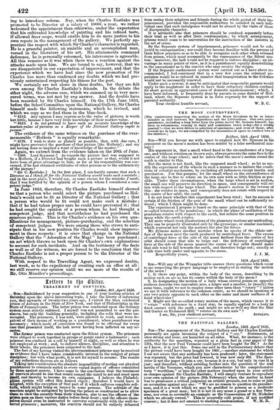tritrrs III fig Oita.
TREATMENT OF CONTICTS.
London, 8th April 1856. .., &a—Emboldened by your suggestion in one of your leading articles of Saturday upon the above interesting topic, I take the liberty of informing you, that upwards of twenty-two years ago, I visited the then celebrated prison of Auburn in the State of New York, and that of Philadelphia in the State of Pennsylvania. The latter prison was conducted upon the Solitary system most strictly enforced. I myself was not permitted to see the pri- soners, but only the building generally, including the cells that were un- occupied. The prisoners, I was told, were allowed to work, and were de- prived of their means of working as a punishment, when punishment was necessary;- which mode of correction was found to be effectual for every case that presented itself, the lash never having been inflicted on any oc- casion.
The former prison was conducted upon the Silent system. The prisoners were obliged to work together in groups or gangs under a taskmaster; each
prisoner confined in a cell by himself at night, as well as when he was not employed at work ; and, to enforce silence, discipline, and attention to their labour, the prisoners were subjected to the lash.
The fact of my having visited the abovementioned prisons may be received as evidence that I have taken considerable interest in the subject ef prison discipline; but with what profit, it is not for myself to assume. The results of my reflections thereon are as follows.
Taking into consideration the absolute impossibility of meting out physical punishment to criminals suited to every-varied degree of offence committed by them against society, I have come to the conclusion that the treatment of convicts should be one that would compel the mind to act and reset upon itaelf, and thereby- to become its own castigator. I believe the Philadel- phian system will effect this desired object ; therefore I would have it adopted, with the exception of that part of it which enforces complete soli- tude, which might bring on lunacy in some persons. The solitude of the convicts might be mitigated by having the prison so constructed as to allow them to view the country- from their windows, also to see the oflioers of the prison pass on their various duties before their doors ; and the officers them- selves should even be instructed to converse occasionally with the well-be- haved prisoners ; moreover, the convicts should not be entirely debarred
from seeing their relatives and friends during the whole period of their im- prisonment, provided the responsible authorities be satisfied in each indi- vidual ease that such indulgence would not be abused by the visits of those of disreputable character. It is advisable also that prisoners should be confined separately before their trial as well as after their condemnation; by which arrangement, prisons would cease to be universities for the instruction of the inmates in the art of crime.
By the Separate system of imprisonment, prisoners would not be sub- jected to contamination; nor could they become familiar with the persons of their fellow prisoners so as to be able to recognize each other when released from prison, which must necessarily be the consequence of the Silent sys- tom moreover, the lash would not be required to enforce discipline ; an ad- vantage in many points of view, as it is a punishment equally demoralizing to the executioner as to the convict who may receive the stripes.
If the Separate confinement system were carried out as I have above re- commended, I feel convinced that in a very few years the criminal po- pulation would be so reduced in number that transportation to the Colonies would not be necessarily renewed. Under such a system it may be anticipated that respectable parents would apply to the magistrate in order to have their refractory children confined for short periods in aggravated cases of domestic mei' demeanour ; whic I have been informed, is frequently done by parents in some district of Hol- land, where the Separate system is in force expressly for the support of parental authority.


























 Previous page
Previous page